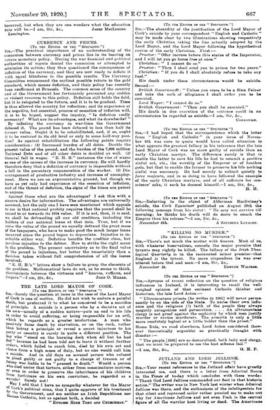CURRENCY AND PRICES.
(To THE EDITOR OF THE " SPECTATOR:9
Sat.—The practical importance of an understanding of the connexion between currency and prices lies in its bearing on future monetary policy. During the war financial and political authorities of repute denied the connexion or attempted to minimize its action; they then questioned the consequences of inflation of the currency, and they are now ready to deflate it with equal blindness to the possible results. The Currency Committee recommend the earliest possible return to the gold standard, which means deflation, and their policy has recently been reaffirmed at Brussels. The common sense of the country and of the Government has fortunately prevented any sudden or violent recourse to this policy. Deflation still holds the field, but it is relegated to the future, and it is to be gradual. Time is thus allowed the country for reflection; and its experience of the negative, but essential, process of cessation of inflation will, it is to be hoped, suggest the inquiry, " Is deflation really necessary? What are its advantages, and what its drawbacks?" By inflating the currency in war-time the Government debased it. The pound has been debased to less than half its former value. Ought it to be rehabilitated, and, if so, ought it to be restored to its old level or only to some half-way posi- tion? As against rehabilitation the following points require consideration : (1) Increased burden of all debts. Double the present value of the pound, and the burden of the 7,000 million Natiooel Debt and of all other debts is doubled as well. (2) General fall in wages. "E. H. B." instances the rise of wages as one of the causes of the increase in currency. He will hardly therefore deny that a deflation of currency is impossible without a fall in the pecuniary remuneration of the worker. (3) Dis- couragement of productive industry and increase of unemploy- ment. Here we are on argumentative ground, but though we have as yet only had experience of the cessation of inflation, and of the threat of deflation, the signs of the times are patent to anyone.
Against these what are the advantages? I ask this with a sincere desire for information. The advantages are universally assumed, but the only one I have seen mentioned which appeals to me is that national probity require. that the pound shall be raised to or towards its 1914 value. If it is not, then, it is said, we shall be defrauding all our old creditors, including the holders of our national loans at that date. True, but if we raise the value of the pound we equally defraud the great mass of the taxpayers, who have to make good the much larger loans incurred since the pound began to depreciate. Injustice is in- evitable either way. Deflation benefits the creditor class, but involves injustice to the debtor. How to strike the right mean IS the problem. The present uncertainty as to the final value of the pound is injurious, but better the uncertainty than a decision taken without full comprehension of all the issues involved.
E. H. B's" letters show a failure to grasp the elements of the problem. Mathematical laws do not, as he seems to think, discriminate between the virtuous and "heaves, ruffians, and


































 Previous page
Previous page